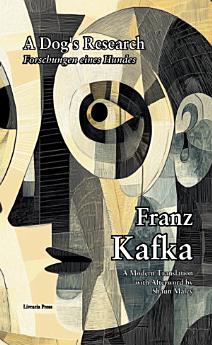A Dog's Research
The Complete Works of Franz Kafka কিতাপ 26 · Continental Press
ইবুক
128
পৃষ্ঠা
family_home
যোগ্য
info
reportমূল্যাংকন আৰু পৰ্যালোচনা সত্যাপন কৰা হোৱা নাই অধিক জানক
এই ইবুকখনৰ বিষয়ে
This has been translated as "Investigations of a Dog" or "Researches of a Dog" and other variations. The original German title was "Forschungen eines Hundes". In the narrative tradition of Voltaire in works such as "Micromégas" (1752), Kafka's story is narrated by a dog who reflects on his life and engages in an obsessive investigation of the mysterious forces governing his world, particularly focusing on the nature of sustenance and survival. The dog questions why food appears as if by magic and struggles to comprehend the rituals and behaviors of other dogs. His inquiries, however, are fraught with frustration, as he is unable to find satisfactory answers, leading to an ongoing sense of existential confusion. "A Dog's Research" can be read as a satirical and philosophical commentary on the limits of human understanding and the search for meaning, just like Voltaire's comedic-philosophic works. The dogs futile quest for knowledge mirrors the human condition, where ultimate truths often remain elusive despite relentless effort. The storys tone, blending humor with melancholy, underscores the tension between curiosity and the inherent limitations of perception. Kafkas use of the dog as a narrator allows him to examine human behaviors and social structures from an outsiders perspective, making this story a profound meditation on existence and the pursuit of knowledge.
লিখকৰ বিষয়ে
A Bohemian novelist and short-story writer, Kafka's work, which fuses elements of realism and the fantastic, typically features isolated protagonists facing bizarre or surrealistic predicaments and incomprehensible socio-bureaucratic powers. His writings, such as "The Metamorphosis" and "The Trial," explore themes of alienation, existential anxiety, and guilt, and are influential in modernist literature.
এই ইবুকখনক মূল্যাংকন কৰক
আমাক আপোনাৰ মতামত জনাওক।
পঢ়াৰ নির্দেশাৱলী
স্মাৰ্টফ’ন আৰু টেবলেট
Android আৰু iPad/iPhoneৰ বাবে Google Play Books এপটো ইনষ্টল কৰক। ই স্বয়ংক্রিয়ভাৱে আপোনাৰ একাউণ্টৰ সৈতে ছিংক হয় আৰু আপুনি য'তে নাথাকক ত'তেই কোনো অডিঅ'বুক অনলাইন বা অফলাইনত শুনিবলৈ সুবিধা দিয়ে।
লেপটপ আৰু কম্পিউটাৰ
আপুনি কম্পিউটাৰৰ ৱেব ব্রাউজাৰ ব্যৱহাৰ কৰি Google Playত কিনা অডিঅ'বুকসমূহ শুনিব পাৰে।
ই-ৰীডাৰ আৰু অন্য ডিভাইচ
Kobo eReadersৰ দৰে ই-চিয়াঁহীৰ ডিভাইচসমূহত পঢ়িবলৈ, আপুনি এটা ফাইল ডাউনল’ড কৰি সেইটো আপোনাৰ ডিভাইচলৈ স্থানান্তৰণ কৰিব লাগিব। সমৰ্থিত ই-ৰিডাৰলৈ ফাইলটো কেনেকৈ স্থানান্তৰ কৰিব জানিবলৈ সহায় কেন্দ্ৰত থকা সবিশেষ নিৰ্দেশাৱলী চাওক।











